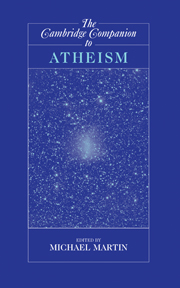Book contents
- Frontmatter
- General Introduction
- Part I Background
- Part II The Case against Theism
- 4 Theistic Critiques of Atheism
- 5 The Failure of Classical Theistic Arguments
- 6 Some Contemporary Theistic Arguments
- 7 Naturalism and Physicalism
- 8 Atheism and Evolution
- 9 The Autonomy of Ethics
- 10 The Argument from Evil
- 11 Kalam Cosmological Arguments for Atheism
- 12 Impossibility Arguments
- Part III Implications
- Index
- Series List
4 - Theistic Critiques of Atheism
from Part II - The Case against Theism
Published online by Cambridge University Press: 28 January 2007
- Frontmatter
- General Introduction
- Part I Background
- Part II The Case against Theism
- 4 Theistic Critiques of Atheism
- 5 The Failure of Classical Theistic Arguments
- 6 Some Contemporary Theistic Arguments
- 7 Naturalism and Physicalism
- 8 Atheism and Evolution
- 9 The Autonomy of Ethics
- 10 The Argument from Evil
- 11 Kalam Cosmological Arguments for Atheism
- 12 Impossibility Arguments
- Part III Implications
- Index
- Series List
Summary
introduction
The last half-century has witnessed a veritable revolution in Anglo- American philosophy. In a recent retrospective, the eminent Princeton philosopher Paul Benacerraf recalls what it was like doing philosophy at Princeton during the 1950s and '60s. The overwhelmingly dominant mode of thinking was scientific naturalism. Metaphysics had been vanquished, expelled from philosophy like an unclean leper. Any problem that could not be addressed by science was simply dismissed as a pseudo-problem. Verificationism reigned triumphantly over the emerging science of philosophy. “This new enlightenment would put the old metaphysical views and attitudes to rest and replace them with the new mode of doing philosophy. ”1 The collapse of verificationism was undoubtedly the most important philosophical event of the twentieth century. Its demise meant a resurgence of metaphysics, along with other traditional problems of philosophy that had been suppressed. Accompanying this resurgence has come something new and altogether unanticipated: a renaissance in Christian philosophy.
The collapse of verificationism was undoubtedly the most important philosophical event of the twentieth century. Its demise meant a resurgence of metaphysics, along with other traditional problems of philosophy that had been suppressed. Accompanying this resurgence has come something new and altogether unanticipated: a renaissance in Christian philosophy.
The face of Anglo-American philosophy has been transformed as a result. Theism is on the rise; atheism is on the decline.2 Atheism, though perhaps still the dominant viewpoint at the American university, is a philosophy in retreat. In a recent article in the secularist journal Philo Quentin Smith laments what he calls “the desecularization of academia that evolved in philosophy departments since the late 1960s.” He complains,
Naturalists passively watched as realist versions of theism . . . began to sweep through the philosophical community, until today perhaps one-quarter or one-third of philosophy professors are theists, with most being orthodox Christians. . . . [I]n philosophy, it became, almost overnight, “academically respectable” to argue for theism, making philosophy a favored field of entry for the most intelligent and talented theists entering academia today.
- Type
- Chapter
- Information
- The Cambridge Companion to Atheism , pp. 69 - 85Publisher: Cambridge University PressPrint publication year: 2006
- 2
- Cited by



